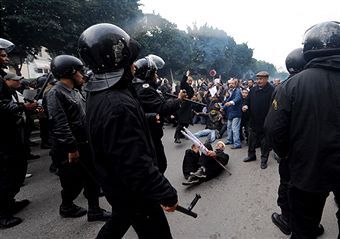 Since the Iraq War, there has been a protracted silence about whether or not the West
should promote democracy and human rights in the Middle East. Predominantly, we have looked away as venal but seemingly stable regimes abuse their citizens, but events in Tunisia have reignited the
debate.
Since the Iraq War, there has been a protracted silence about whether or not the West
should promote democracy and human rights in the Middle East. Predominantly, we have looked away as venal but seemingly stable regimes abuse their citizens, but events in Tunisia have reignited the
debate.
Writing in the International Herald Tribune, Roger Cohen argues that the West’s support for stability in the Middle East proved in the end a recipe for radicalisation:
Striking a balance between supporting stability and encouraging freedom is notoriously difficult. In times of economic hardship it is seductively easy for a country like Britain to try to focus on stability, in the hope of avoiding foreign entanglements and promoting trade. But as events in Tunisia shows, such a policy can prove problematic in the long-run.“Arab regimes, many of them U.S. allies, have lost touch with young populations. Their ossified, repressive, nepotistic, corrupt systems have proved blind to the awakening stirred by satellite TV networks, Facebook posts, tweets, Web videos and bloggers.They have proved skilled only at provoking guffaws at their regular “elections” and fostering the rise of extreme Islamism among populations left with no refuge but religion. Their “stability” has been sustained at the price of paralysis. It has depended on a readiness to terrorize and torture. These Arab holdovers, moribund as the waxworks at Madame Tussauds, are ripe for transformation, the anciens régimes of 2011. The U.S. responsibility for this Arab failure has been significant: America has preferred the stable despot to the Islamist risk of democracy (despite the fact that the only likely remedy to the seductive illusion of political Islamism is the responsibility of government).”






Comments